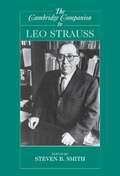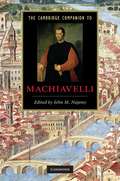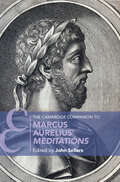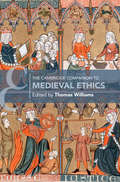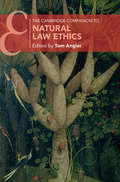- Table View
- List View
The Cambridge Companion to LEO STRAUSS
by Steven B. SmithLeo Strauss was a central figure in the 20th century renaissance of political philosophy. The essays of The Cambridge Companion to Leo Strauss provide a comprehensive and non-partisan survey of the major themes and problems that constituted Strauss's work. These include his revival of the great 'quarrel between the ancients and the moderns,' his examination of tension between Jerusalem and Athens, and most controversially his recovery of the tradition of esoteric writing. The volume also examines Strauss's complex relation to a range of contemporary political movements and thinkers, including Edmund Husserl, Martin Heidegger, Max Weber, Carl Schmitt, and Gershom Scholem, as well as the creation of a distinctive school of 'Straussian' political philosophy.
The Cambridge Companion to Leibniz
by Nicholas JolleyA remarkable thinker, Gottfried Leibniz made fundamental contributions not only to philosophy, but also to the development of modern mathematics and science. At the center of Leibniz's philosophy stands his metaphysics, an ambitious attempt to discover the nature of reality through the use of unaided reason. This volume provides a systematic and comprehensive account of the full range of Leibniz's thought, exploring the metaphysics in detail and showing its subtle and complex relationship to his views on logic, language, physics, and theology.
The Cambridge Companion to Levinas
by Simon Critchley Robert BernasconiEmmanuel Levinas is now widely recognized alongside Heidegger, Merleau-Ponty and Sartre as one of the most important Continental philosophers of the twentieth century. His abiding concern was the primacy of the ethical relation to the other person and his central thesis was that ethics is first philosophy. His work has had a profound impact on a number of fields outside philosophy--such as theology, Jewish studies, literature and cultural theory, psychotherapy, sociology, political theory, international relations theory and critical legal theory.
The Cambridge Companion to Life and Death
by Steven LuperThis volume meets the increasing interest in a range of philosophical issues connected with the nature and significance of life and death, and the ethics of killing. What is it to be alive and to die? What is it to be a person? What must time be like if we are to persist? What makes one life better than another? May death or posthumous events harm the dead? The chapters in this volume address these questions, and also discuss topical issues such as abortion, euthanasia, and suicide. They explore the interrelation between the metaphysics, significance, and ethics of life and death, and they discuss the moral significance of killing both people and animals, and the extent to which death harms them. The volume is for all those studying the philosophy of life and death, for readers taking applied ethics courses, and for those studying ethics and metaphysics more generally.
The Cambridge Companion to Locke
by Vere ChappellThe essays in this volume provide a systematic survey of Locke's philosophy informed by the most recent scholarship. They cover Locke's theory of ideas, his philosophies of body, mind, language, and religion, his theory of knowledge, his ethics, and his political philosophy. There are also chapters on Locke's life and subsequent influence. New readers and nonspecialists will find this the most convenient, accessible guide to Locke currently available.
The Cambridge Companion to Locke's "Essay Concerning Human Understanding"
by Lex NewmanFirst published in 1689, John Locke's Essay Concerning Human Understanding is widely recognised as among the greatest works in the history of Western philosophy. The Essay puts forward a systematic empiricist theory of mind, detailing how all ideas and knowledge arise from sense experience. Locke was trained in mechanical philosophy and he crafted his account to be consistent with the best natural science of his day. The Essay was highly influential and its rendering of empiricism would become the standard for subsequent theorists. This Companion volume includes fifteen new essays from leading scholars. Covering the major themes of Locke's work, they explain his views while situating the ideas in the historical context of Locke's day and often clarifying their relationship to ongoing work in philosophy. Pitched to advanced undergraduates and graduate students, it is ideal for use in courses on early modern philosophy, British empiricism and John Locke.
The Cambridge Companion to Logical Empiricism
by Alan Richardson Thomas UebelIf there is a movement or school that epitomizes analytic philosophy in the middle of the twentieth century, it is logical empiricism. Logical empiricists created a scientifically and technically informed philosophy of science, established mathematical logic as a topic in and tool for philosophy, and initiated the project of formal semantics. Accounts of analytic philosophy written in the middle of the twentieth century gave logical empiricism a central place in the project. The second wave of interpretative accounts was constructed to show how philosophy should progress, or had progressed, beyond logical empiricism. The essays survey the formative stages of logical empiricism in central Europe and its acculturation in North America; discusses its main topics, and achievements and failures, in different areas of philosophy of science; and assesses its influence on philosophy, past, present, and future.
The Cambridge Companion to Machiavelli
by John M. NajemyA vivid portrait of this extraordinary thinker, assessing his place in Western thought since the Renaissance.
The Cambridge Companion to Maimonides
by Kenneth SeeskinOne aim of this series is to dispel the intimidation readers feel when faced with the work of difficult and challenging thinkers. Moses ben Maimon, also known as Maimonides (1138-1204), represents the high point of Jewish rationalism in the middle ages. He played a pivotal role in the transition of philosophy from the Islamic East to the Christian West. His greatest philosophical work, The Guide of the Perplexed, had a decisive impact on all subsequent Jewish thought and is still the subject of intense scholarly debate. An enigmatic figure, Maimonides continues to defy simple attempts at classification. The twelve essays in this volume offer a lucid and comprehensive treatment of his life and thought. They cover the sources on which Maimonides drew, his contributions to philosophy, theology, jurisprudence, and Bible commentary, as well as his esoteric writing style and influence on later thinkers.
The Cambridge Companion to Malebranche
by Steven NadlerThe French philosopher and theologian Nicholas Malebranche was one of the most important thinkers of the early modern period. A bold and unorthodox thinker, he tried to synthesize the new philosophy of Descartes with the religious Platonism of St. Augustine. This is the first collection of essays to address Malebranche's thought comprehensively and systematically. There are chapters devoted to Malebranche's metaphysics, his doctrine of the soul, his epistemology, the celebrated debate with Arnauld, his philosophical method, his occasionalism and theory of causality, his philosophical theology, his account of freedom, his moral philosophy, and his intellectual legacy.
The Cambridge Companion to Marcus Aurelius' Meditations (Cambridge Companions to Literature)
by John SellarsThe Meditations of the second-century Roman emperor Marcus Aurelius is consistently one of the best-selling philosophy books among the general public. Over the years it has also attracted famous admirers, from the Prussian king Frederick the Great to US President Bill Clinton. It continues to attract large numbers of new readers, drawn to its reflections on life and death. Despite this, it is not the sort of text read much by professional philosophers or even, until recently, taken especially seriously by specialists in ancient philosophy. It is a highly personal, easily accessible, yet deceptively simple work. This volume, written by leading experts and aimed at non-specialists, examines the central philosophical ideas in the work and assesses the extent to which Marcus is committed to the philosophy of Stoicism. It also considers how we ought to read this unique work and explores its influence from its first printed publication to today.
The Cambridge Companion to Marx
by Terrell CarverIn light of the post-Soviet era of socialist scholarship, political scientists, philosophers, and historians reappraise the work of Frederich Engels (1850-95), a pivotal figure of the classical European labor movement. Primarily they investigate his role as an independent socialist thinker after Marx's death in 1883 and the theoretical significance and historical impact of his contributions to philosophy, science, political economy, history, and socialist politics. Annotation c. Book News, Inc. , Portland, OR (booknews. com)
The Cambridge Companion to Medieval Ethics (Cambridge Companions to Philosophy)
by Thomas WilliamsEthics was a central preoccupation of medieval philosophers, and medieval ethical thought is rich, diverse, and inventive. Yet standard histories of ethics often skip quickly over the medievals, and histories of medieval philosophy often fail to do justice to the centrality of ethical concerns in medieval thought. This volume presents the full range of medieval ethics in Christian, Islamic, and Jewish philosophy in a way that is accessible to a non-specialist and reveals the liveliness and sophistication of medieval ethical thought. In Part I there is a series of historical chapters presenting developmental and contextual accounts of Christian, Islamic, and Jewish ethics. Part II offers topical chapters on such central themes as happiness, virtue, law, and freedom, as well as on less-studied aspects of medieval ethics such as economic ethics, the ethical dimensions of mysticism, and sin and grace. This will be an important volume for students of ethics and medieval philosophy.
The Cambridge Companion to Medieval Jewish Philosophy
by Daniel H. Frank Oliver LeamanInfluenced originally by Islamic theological speculation, classical philosophers and Christian Scholasticism of the Middle Ages, Jewish thinkers living in Islamic and Christian lands philosophized about Judaism from the ninth to fifteenth centuries. They reflected on the nature of language about God, the creation of the world, the possibility of human freedom and the relationship between divine and human law. This Companion presents major medieval Jewish thinkers in a comprehensive introduction to a vital period of Jewish intellectual history.
The Cambridge Companion to Medieval Logic (Cambridge Companions to Philosophy)
by Catarina Dutilh Novaes Stephen ReadThis volume, the first dedicated and comprehensive companion to medieval logic, covers both the Latin and the Arabic traditions, and shows that they were in fact sister traditions, which both arose against the background of a Hellenistic heritage and which influenced one another over the centuries. A series of chapters by both established and younger scholars covers the whole period including early and late developments, and offers new insights into this extremely rich period in the history of logic. The volume is divided into two parts, 'Periods and Traditions' and 'Themes', allowing readers to engage with the subject from both historical and more systematic perspectives. It will be a must-read for students and scholars of medieval philosophy, the history of logic, and the history of ideas. Features an excellent and international contributor team of established and younger scholars. Divided into 'periods and traditions' and 'themes' to cater for both those with predominantly historical and those with more systematic interests. Gives substantial attention to the Arabic as well as the Latin tradition of medieval logic.
The Cambridge Companion to Medieval Philosophy
by A. S. McgradeSpanning a millennium of thought extending from Augustine to Thomas Aquinas and beyond, this volume takes its readers into one of the most exciting periods in the history of philosophy. It includes not only the thinkers of the Latin West but also the profound contributions of Islamic and Jewish philosophers such as Avicenna and Maimonides. Leading specialists examine what it was like to study philosophy in the cultures and institutions of the Middle Ages. Supplementary material includes chronological charts and biographies of the major thinkers.
The Cambridge Companion to Merleau-Ponty
by Mark B. N. Hansen Taylor CarmanMaurice Merleau-Ponty (1908–1961) was described by Paul Ricoeur as 'the greatest of the French phenomenologists'. The essays in this 2004 volume examine the full scope of Merleau-Ponty's philosophy, from his central and abiding concern with the nature of perception and the bodily constitution of intentionality to his reflections on science, nature, art, history, and politics. The authors explore the historical origins and context of his thought as well as its continuing relevance to contemporary work in phenomenology, philosophy of mind, cognitive science, biology, art criticism and political and social theory. What emerges is a fresh image of Merleau-Ponty as a deep and original thinker whose philosophical importance has been underestimated, in part owing to the influence of intellectual movements such as existentialism and structuralism, into which his work could not be easily assimilated. New readers will find this the most convenient and accessible guide to Merleau-Ponty currently available.
The Cambridge Companion to Mill
by John SkorupskiJohn Stuart Mill (1806-73) ranks among the very greatest thinkers of the nineteenth century. His impact through his books, journalism, correspondence, and political activity on modern culture and thought has been immense, and his continuing importance for contemporary philosophy and social thought is widely recognised. This Companion furnishes the reader with a systematic and fully up-to-date account of the many facets of Mill's thought and influence. New readers will find this the most convenient and accessible guide to Mill currently available. Advanced students and specialists will find a conspectus of recent developments in the interpretation of Mill.
The Cambridge Companion to Modern Jewish Philosophy
by Michael L. Morgan Peter Eli Gordon"The Cambridge Companion to Modern Jewish Philosophy is a collection of original essays that examine the work of some of the most important Jewish thinkers of the modern era - the period extending from the seventeenth century to the late twentieth century. "--BOOK JACKET.
The Cambridge Companion to Modernist Culture
by Celia MarshikModernism emerged alongside radical challenges to traditional belief systems, the reorganization of public and private spheres, new modes of visual display, and innovations in recreation and entertainment. This interdisciplinary collection focuses on the diverse inventions, products, pastimes, and creative forms that responded to and inspired American and European literature. This volume explores such wide-ranging subjects as religion, dance, and publishing, thus introducing readers to the diversity of modernist culture. The Companion serves as a valuable resource for both those undertaking the study of modernism for the first time and those seeking to expand their knowledge of modernism's cultural moment.
The Cambridge Companion to Natural Law Ethics (Cambridge Companions to Philosophy)
by Tom AngierNatural law ethics centres on the idea that ethical norms derive from human nature. The field has seen a remarkable revival since the millennium, with new work in Aristotelian metaphysics complementing innovative applied work in bioethics, economics and political theory. Starting with three chapters on the history of natural law ethics, this volume moves on to various twentieth-century theoretical innovations in the tradition, and then to natural law as embedded in the three Abrahamic faiths. It closes with sections on applied natural law ethics and the challenges and prospects for natural law ethics in the twenty-first century. Uniquely interdisciplinary and written without technical jargon, the book will be of great interest to students and researchers in philosophy, theology, political theory and economics. They will find this the go-to resource for cutting-edge thinking in natural law ethics.
The Cambridge Companion to Nietzsche
by Kathleen M. Higgins Bernd MagnusThe significance of Friedrich Nietzsche for twentieth century culture is now no longer a matter of dispute. He was quite simply one of the most influential of modern thinkers. The opening essay of this 1996 Companion provides a chronologically organised introduction to and summary of Nietzsche's published works, while also providing an overview of their basic themes and concerns. It is followed by three essays on the appropriation and misappropriation of his writings, and a group of essays exploring the nature of Nietzsche's philosophy and its relation to the modern and post-modern world. The final contributions consider Nietzsche's influence on the twentieth century in Europe, the USA, and Asia. New readers and non-specialists will find this the most convenient, accessible guide to Nietzsche currently available. Advanced students and specialists will find a conspectus of recent developments in the interpretation of Nietzsche.
The Cambridge Companion to Nozick's Anarchy, State, and Utopia
by Ralf M. Bader John Meadowcroft"Motion 5 - So funktioniert's" von der GEM Reihe (Graphically Enhanced Manuals) erklärt Apple's neue Motion 5 Software mit reichhaltigen Illustrationen die man sonst nirgendwo findet in den offiziellen Anleitungen und Büchern. Dieses 147 seitige Buch in Großformat hilft ihnen in eingänglicher Weise die Konzepte und Arbeitsvorgänge in Motion 5 zu verstehen und meistern. Was sind Graphically Enhanced Manuals (GEM)?Es handelt sich hierbei um eine neue Art von Anleitungen, die einen Schwerpunkt auf die visuelle Vermittlung des Stoffes legen. Dies hilft ihnen, eine Applikation zu VERSTEHEN und nicht nur zu LERNEN. Sie müssen nicht mühselig 500 Seiten trockene Bedienungsanleitungen mit reinen Texterklärungen durchlesen. Umfangreiche Graphiken und Diagramme helfen Ihnen dabei, den "aha" Effekt zu erfahren und selbst bei komplizierten Sachverhalten durchzublicken. Die Graphically Enhanced Manuals ermöglichen es Ihnen, ein Programm viel schneller mit einem wesentlich tieferen Verständnis der Konzepte, Funktionen und Arbeitsvorgänge zu meistern - und das in einer intuitiven und leicht verständlichen Art und Weise.
The Cambridge Companion to Oakeshott
by Efraim PodoksikMichael Oakeshott (1901-1990) was one of the leading British philosophers of the twentieth century. He has been influential particularly as a political philosopher, but his work reflects a range of philosophical interests that have more gradually come to be appreciated. In this volume a broad group of scholars offers a comprehensive overview of Oakeshott's philosophy, including his moral and political philosophy, his philosophy of history, science and aesthetics, and his views on the role of education. They analyse Oakeshott's ideas in different intellectual contexts and assess his overall contribution to twentieth-century thought. Accessible and rich with new scholarly material, this volume will be an excellent guide for students and scholars alike.
The Cambridge Companion to Ockham
by Paul Vincent SpadeThe Franciscan William of Ockham (c. 1288–1347) was an English medieval philosopher, theologian, and political theorist. Along with Thomas Aquinas and Duns Scotus, he is regarded as one of the three main figures in medieval philosophy after around 1150. Ockham is important not only in the history of philosophy and theology, but also in the development of early modern science and of modern notions of property rights and church-state relations. This volume offers a full discussion of all significant aspects of Ockham's thought: logic, philosophy of language, metaphysics and natural philosophy, epistemology, ethics, action theory, political thought and theology. It is the first study of Ockham in any language to make full use of the new critical editions of his works, and to consider recent discoveries concerning his life, education, and influences.
